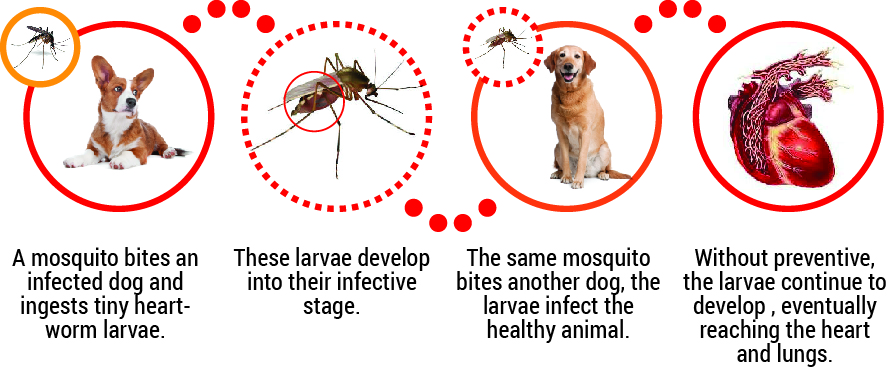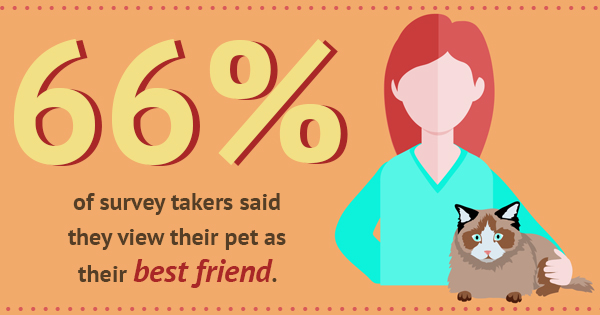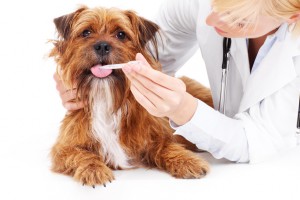Does my dog really need to be on heartworm prevention if he doesn’t even go outside? The answer to that question is yes! Heartworm disease is a very serious and potentially fatal disease. It is caused by worms that live in the heart, lungs, and surrounding vessels. It occurs in both dogs and cats. Heartworm disease is transmitted by an infected mosquito. All it takes is one mosquito bite to become infected. Even if your dog or cat doesn’t go outside, mosquitoes can come in to the house.
Some common symptoms of heartworm disease in dogs are coughing, fatigue, anorexia, sudden collapse, and labored breathing. While cats may show coughing, occasional vomiting, and anorexia. Once the infected mosquito bites a dog or cat, tiny worms are released into the bloodstream where they mature and become adult worms within 5-6 months. Dogs can have many worms at one time, while cats usually only have 2-6 worm at once. Heartworms in dogs can live between 5-6 years and only 2-3 years in cats.
According to the American Heartworm Society, heartworm disease is currently in all 50 states. So again, why do I need to buy prevention? Because heartworm treatment is very expensive in dogs and because there isn’t a treatment option for cats. To treat heartworms in dogs it costs around $1,000 and your dog may have to live with lifelong consequences due to damage of the heart from the worms, even after the treatment is complete. Most heartworm preventions also treat common intestinal parasites and some also treat fleas.
Another question you may ask is whether it’s recommended to stop prevention during the winter time. The answer to that is no! Mosquitoes can be found all year round in a lot of locations. It’s also difficult to get the timing right of when it’s okay to stop and when you should re-start. Preventing heartworms all year round is recommended by the American Heartworm Society, no matter what region you live in.
Your dog should be tested at 6 months old and 6 months later. Heartworms aren’t detectable until 5-6 months after the mosquito bite. After the 1 year heartworm test, it’s only annually, unless you switch to a different heartworm medication or you forget or stop giving it. Cats should be tested before they are put on medication and as often as the veterinarian decides is appropriate. Heartworm prevention isn’t 100% effective and you may forget to give it, which is why annual heartworm tests are important even if you are faithfully giving it. Giving certain heartworm preventions in a dog or cat with heartworm disease can cause serious problems.
Get your animal tested today and started on heartworm prevention! At Ez vet, we can do the heartworm test right in the station, with results before you leave. We also carry several different heartworm prevention options to purchase. For more information on heartworm disease, please visit the American Heartworm Society website at htt://www.heartwormsociety.org.


)


 Thanksgiving is right around the corner, its time for reflection, expressing gratitude and gatherings of friends and family and of course food. The temptation for sharing your holiday food is hard to resist, as most of us relate sharing food with expressing love . As a result, thanksgiving is also a time for visiting the veterinarian or emergency , where dogs end up when they over indulged. We have prepared a list of Thanksgiving meal do’s and don’ts for pets to help your keep your pets healthy this holiday season and prevent unexpected holiday emergency and diversion.
Thanksgiving is right around the corner, its time for reflection, expressing gratitude and gatherings of friends and family and of course food. The temptation for sharing your holiday food is hard to resist, as most of us relate sharing food with expressing love . As a result, thanksgiving is also a time for visiting the veterinarian or emergency , where dogs end up when they over indulged. We have prepared a list of Thanksgiving meal do’s and don’ts for pets to help your keep your pets healthy this holiday season and prevent unexpected holiday emergency and diversion.


 When you have made the decision to adopt a pet, you take on the responsibility of a life. It is up to you to ensure that your pet stays happy and healthy. With 47% of American households owning a dog and 37% owning a cat, pet care is a popular topic that more people need to be knowledgeable on. About 66% of pet owners say their pet is their best friend so it is essential to keep them happy and to get them any urgent pet care they may need. Read on for our three tips to help out your pets!
When you have made the decision to adopt a pet, you take on the responsibility of a life. It is up to you to ensure that your pet stays happy and healthy. With 47% of American households owning a dog and 37% owning a cat, pet care is a popular topic that more people need to be knowledgeable on. About 66% of pet owners say their pet is their best friend so it is essential to keep them happy and to get them any urgent pet care they may need. Read on for our three tips to help out your pets!